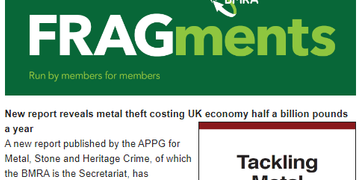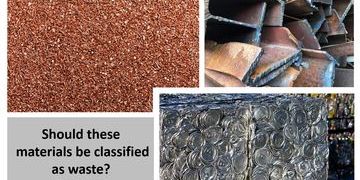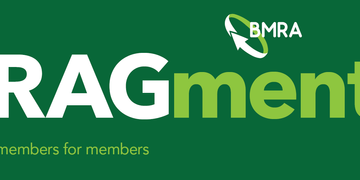Demand a major concern as activity levels remain well below normal
Nearing the end of a quarter that has been utterly dominated by COVID-19, the world recycling association has called upon the experience of BIR Ambassadors to provide the latest update on the pandemic’s impact on recycling activities in their respective countries and regions.
COVID-19 has been devastating but some light can now be seen at the end of the tunnel. The pandemic has affected commodity markets in a variety of ways. Companies’ operations have been disrupted by isolated outbreaks and government-mandated shutdowns, keeping demand low for many commodities and likely to remain so in the near term.
Shutdowns and temporary stops could lead to an overall industry production loss as high as 40%. Depending on the strength of the recovery, market shocks could mean the industry losing US$ 200 billion in earnings owing to the sales drop-off in, for example, the aerospace and automotive sectors. The impact has been felt by metals producers and hence by recyclers worldwide.
Secondary aluminium has been severely affected by the lack of demand for ingots from the automotive and aerospace industries. Demand has been equally low, if not worse, for nickel and molybdenum, and has been dented for high temperature alloys including titanium. The stop on auto production has also hit demand for chrome steel and ferro-titanium. Other recycling activities - such as paper and cardboard, plastics and textiles - are suffering as a result of oversupply and a lack of demand, not least because consumer confidence is very low.
The COVID-19 pandemic is already inflicting a dramatic economic cost on the Middle East, with both negative demand/supply shocks coupled with the collapse in oil prices. Major oil-producing countries have dug into their reserves to make up for budget deficits during the unprecedented oil price crash.
The light at the end of the tunnel has been seen in the gradual lifting of the major lockdown restrictions amid social distancing and health monitoring parameters. Major oil-producing countries have issued additional stimulus funding packages to the most affected sectors of the economy. Most recycling facilities are back to relative normality but are struggling with lower volumes and margins. Business in the scrap sector has started to pick up again but volumes are 50% below the previous average, one source has reported.
The revival of the construction sector and a resumption of halted infrastructure projects bode well for scrap generation in the Middle East. Major airports have announced resumptions for repatriation and receiving tourists, confirmed by Dubai for July 7 onwards. Federal discussions are under way to review the reopening of schools for the 2020/21 academic year as well as the raising of in-office workforces from 30% to 50%.
In other feedback from the Middle East, it has been indicated that most countries will open fully by the end of June although face masks and social distancing will be required. In the near future, travel requirements will be published country by country.
In Bahrain, most government and private sector employees are continuing to work from home. Industrial and commercial businesses are operational and slowly increasing their activities with strict compliance to the rules. All businesses have been affected by this crisis, with the closure of some small companies leading to more expatriate employees losing their jobs.
The scrap sector in Bahrain is said to be running at around 30% efficiency, with hopes of a significant improvement by the end of this year.
A major concern for recyclers in many parts of the world has been the huge congestion caused by thousands of containers lying in Indian ports despite free extensions by some of the major shipping lines. More disturbing is the fact that some buyers have abandoned containers, seeking deferment of contractual terms, unjustifiable discounts or even cancellation of contracts. This has put major worldwide suppliers in a “Catch-22” situation and has been described as an unwelcome echo of the 2008 financial crisis. Indeed, it is acknowledged from India that many shippers have lost large amounts of money as a result of buyers leaving containers or asking for discounts.
Businesses are working in India but a return to full operation is seen as unlikely in the near term. The number of COVID-19 infections is increasing rapidly, especially in major cities, and creating fear among buyers. Factories are working at around 50% of capacity and huge problems are surrounding labour and finance rotation. Some businesses are said to be working at only 20-30% of the norm, and so are making a loss either way.
Across into Europe, Germany has launched a decentralized, contact-tracing app to fight the virus when the expected second wave arrives. Through very sharp organization of testing, it will be possible to lock down specific areas instead of closing all doors within an entire region. Meanwhile, nearly everything has returned to normal - with some exceptions such as large events like concerts.
Step by step, scrap activities are returning. With the restarting of the automotive industry, supply noticeably improved in May and June. Transport within Germany is functioning but there is an expectation of lower water levels for several rivers owing to the dry period in recent weeks, and so scrap movements via inland waterways might suffer as a result.
In recent years, many smelters switched to just-in-time delivery and the scrap industry has been pushed into stocking furnace-ready raw material for their customers. The stocking and financing have put major pressure on some market participants in terms of cash flow. Credit insurances are cutting in the same time limits and are creating an additional pressure, with insurance companies expecting some bankruptcies in the metals sector.
The number of daily COVID-related deaths is slowly decreasing in the UK and lockdown restrictions are gradually being lifted. Most metals recycling companies are back at work but volumes are typically 50% down on this time last year despite the improvement in prices. Many companies still have staff furloughed; the fear is that, once this government-funded support is withdrawn totally in October, the recycling sector will be among those making redundancies.
According to the government and medical experts in France, the virus is still with us but its spread is under control. Social and commercial life is resuming at a reasonably rapid pace depending upon the sector of activity, but people remain preoccupied by the fear of bankruptcies and the many thousands who have become unemployed.
In the metals recycling sector, the return to frontline business is happening much more quickly than expected. For ferrous scrap, demand from Turkey is supporting sales while non-ferrous metals - in particular copper - are sought after in the context of rising prices; however, secondary aluminium has been severely affected by a lack of ingot demand for the automotive industry.
Most US states are allowing at least the partial reopening of non-essential retail, manufacturing and offices, tied to strict health and safety requirements for businesses with in-person operations. Stricter local orders may remain in place by city or county, and some states have ordered reopenings to be conducted on a regional basis.
Recent state announcements have included: Phase 3 reopening on May 22 in Alaska with businesses at 100% capacity; Phase 2 general business reopening in Kansas from May 22 with general and industry-specific requirements; Phase 2 reopening from June 1 in Montana allowing all businesses to operate according to guidelines; business restrictions and sector-specific operating requirements to remain in effect in Ohio; and expanded criteria in Washington for counties to move early into Phase 2 with non-essential manufacturing and in-store retail reopenings.
On the whole in the USA, business is coming back slowly. However, the easing of restrictions has been complicated by more cases of COVID-19 as a result of increased exposure of participants at many of the protests held in the USA.
There have been more than 200 confirmed COVID-19 cases in China this past week. All businesses are open but masks, temperature checks and social distancing are required almost everywhere. Inter-province travel is allowed but in-bound international travellers must still submit to 14 days of quarantine. At the time of writing, details are still awaited concerning China’s new import procedure covering reclassified “recycled materials”.
Hong Kong has recovered fairly well following the government’s decisive lockdown quarantine and social-distancing policies in the early stages; the discipline of the Hong Kong people has led to some of the lowest fatality rates. Most commercial activities have returned to normal, including metals recyclers, and demand in China appears to have regained much of its momentum in the secondary metals market.
There are still concerns over the risk of a second wave of COVID-19 infections after a cluster emerged recently in Beijing, showing that vigilance is still required.
Of late, Taiwan has recorded only one confirmed case of COVID-19 regarding a traveller returning from Bangladesh; people are generally wearing masks in public places. All businesses are open as usual.
Singapore entered Phase 2 of the lockdown easing process on June 19, with no timeline set for Phase 3. Most economic activities have been allowed to reopen so long as: safe distancing is observed; non-essential staff continue to work from home; and the number of business/social visitors does not exceed five at any time. International travel is still limited to repatriation.
The foreign workers crucial to Singapore’s manufacturing and service economy are now being permitted, albeit on a case-to-case basis according to the critical nature of their job and skill-sets; they must also complete 14 days of public-place quarantine at the company’s expense. As a result, some workers should begin to enter the work flow from around the second week of July.
Manufacturing and the generation of new production scrap are very slow and limited, and no real pick-up is envisaged until the end of July. Two key sectors for the metals business - oil/gas and aerospace - are facing a very difficult downturn, thus impacting not only scrap generation but also demand for nickel and moly alloy scrap and high temperature alloy scrap, including titanium. The automotive sector has been hard hit too, undermining demand for chrome steel and even ferro-titanium. The outlook for tool steel and high speed steel is linked to the pace of manufacturing revival.



